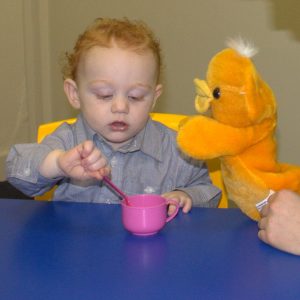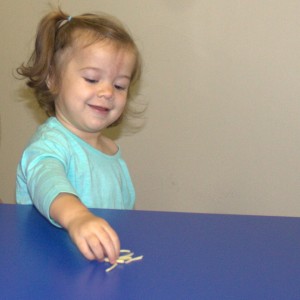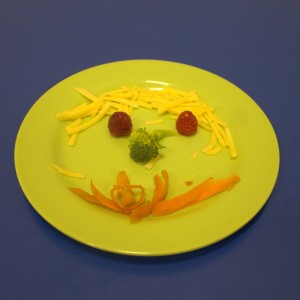 Eating is an easy, enjoyable and natural thing for most children, but for some eating can be hard. They may struggle to manage food or avoid eating. There are many reasons why eating can be hard for kids. A number of Talking Matters speech pathologists and occupational therapists have done training in the SOS (sequential oral sensory) approach to feeding with Dr Kay Toomey. This helped us understand why many of the children we work with struggle with eating and what can be done to help them. Here are some of the things we learned about why eating is so difficult for some kids.
Eating is an easy, enjoyable and natural thing for most children, but for some eating can be hard. They may struggle to manage food or avoid eating. There are many reasons why eating can be hard for kids. A number of Talking Matters speech pathologists and occupational therapists have done training in the SOS (sequential oral sensory) approach to feeding with Dr Kay Toomey. This helped us understand why many of the children we work with struggle with eating and what can be done to help them. Here are some of the things we learned about why eating is so difficult for some kids.
- Eating doesn't just happen. It's easy to think that eating is an instinct and our bodies just know what to do. This is true for the first 3 to 4 months when babies have instinctive movement reflexes that helps them feed "automatically". But these reflexes fade as babies get older so by 5 to 6 months eating is something that we need to learn and that we choose to do.
- Eating is not the most important thing to our body. Often people say kids will eat if they are hungry enough. But some children can ignore hunger and choose to go without food. Our bodies first priority is to breathe. When we eat, we briefly stop breathing to swallow food, so if this is difficult it may be a reason not too eat. We are also designed to avoid pain and danger, so if eating causes pain or discomfort, or seems stressful then this is also a reason to not eat. For many children the sensory aspects involved in eating are also unpleasant or stressful things they want to avoid.
 Eating skills develop over a long period of time. Typically developing children don't have all the skills to manage adult food until between 18 and 24 months of age. For children whose development is delayed it may take much longer to develop the skills to manage eating a full range of foods.
Eating skills develop over a long period of time. Typically developing children don't have all the skills to manage adult food until between 18 and 24 months of age. For children whose development is delayed it may take much longer to develop the skills to manage eating a full range of foods.- Eating requires complex motor movements and control. Eating actually involves all your organs working correctly and uses all your muscles. The movements are also very complex. For example when chewing the muscles on the two different sides of the tongue may be moving in different ways to make side to side movements. This is even trickier than when speaking, as in speech the movements are symmetrical, with both sides moving either up/down or back/forward at the same time. Movements for eating include:
- controlling the trunk and head to sit upright and hold the head still,
- eye hand co-ordination to get food to the mouth,
- jaw and lip movements to bite, move food into the mouth and hold it there
- tongue, cheek and jaw movements to position the food and chew it
- tongue and cheek movements to position the food for swallowing
- coordinating tongue, palate, epiglottis and breathing for swallowing
- Eating is also very complex for our senses. It's not just about taste; eating uses all of our senses. The sights, sounds, touch, texture and smell of food effects our ability to eat as does our awareness of body position and balance. For children who are over sensitive to sensory information all these senses working at once can be overwhelming. Because we can't see inside our own mouths, our senses of touch and taste help us know where food is inside our mouths and how it is moving around and changing as we chew. If our senses are under sensitive it can be hard to tell where food is, how big it is, how much we need to chew and when it is ready to swallow.
 There are many, many steps to eating. Dr Toomey described 25 steps that typical children move through to eat food and explained that some children with additional needs may need to learn to work through up to 32 steps. The steps begin when the food is brought into the room and the child learns to tolerate the look and smell of the food as it is put on the table, through interacting and touching the food, to tasting, biting, chewing and swallowing.
There are many, many steps to eating. Dr Toomey described 25 steps that typical children move through to eat food and explained that some children with additional needs may need to learn to work through up to 32 steps. The steps begin when the food is brought into the room and the child learns to tolerate the look and smell of the food as it is put on the table, through interacting and touching the food, to tasting, biting, chewing and swallowing.- It is okay to play with your food. It may be messy but it is an important learning opportunity. When young children touch and play with their food they are learning about the sensory properties of food; it's look, smell, temperature and texture to prepare their senses for when they eat. As they squish and squeeze it they are learning how the food changes, which helps prepare for biting and chewing. Putting things in your mouth such as food and fingers is okay too, as it prepares the muscles and the senses for the skills needed for eating. Getting kids involved with preparing foods is a good way to give older kids this type of learning experience.
- Variety is the key. Children who eat a wider range of foods are generally healthier than those who eat less variety. Increasing the number of different foods your child will eat is most important. When your child is comfortable with a range of foods they will usually manage the amount of food they eat. It's okay to offer your child breakfast foods in the afternoon, or dinner time foods as snacks. It's great to experiment with foods from different cultures and try out new foods that you find. Young children often need to see a food many, many times before they will eat it, so offer new foods and expect some waste. If your child really doesn't like new foods, familiar foods presented in new ways can help them gradually become more adventurous, such as cutting foods in different shapes or presenting it in different ways (raw, cooked, sliced, grated etc).
 Are you concerned about your child's eating? Check out the red flags for problem eaters from the SOS approach to feeding to see if your child would benefit from support. Talking Matters are planning to offer individual and group support for fussy eaters beginning in April based on what we learned from the SOS approach to feeding.
Are you concerned about your child's eating? Check out the red flags for problem eaters from the SOS approach to feeding to see if your child would benefit from support. Talking Matters are planning to offer individual and group support for fussy eaters beginning in April based on what we learned from the SOS approach to feeding.
Follow our blog to find out more about helping fussy eaters over the next few weeks and about supporting kids with special needs every week of the the year.
Talking Matters provides speech pathology and occupational therapy for children. We have a range of service options including individual therapy in our office at bright, child friendly clinic in Elizabeth Downs as well as group programs, including groups for fussy eaters in school holidays.
Whether you live locally and can come in and see us, or are further afield and want to make use of our extensive range of free resources, we look forward to sharing our passion for helping kids learn and develop. If you are concerned about your child's visit the Talking Matters website to see how we can help. browse our website or call us on (08) 8255 7137 to find out more.
For more ideas and resources for developing children's speech, language, learning and social skills check our extensive Pinterest page. Like us on Facebook and follow us on Twitter so you don't miss out on what's happening.
Related Blog Posts
If you liked this post you may also like:
Developing Eating Skills
Supporting Fussy Eaters
Boost brain power!
Helping fussy and reluctant eaters



